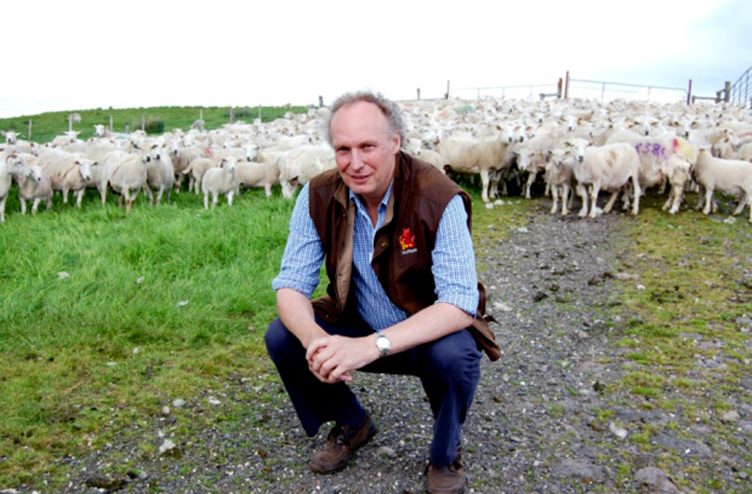
The story of Ballycoose Farm in County Antrim is a gripping one. The Tweed family has been synonymous with farming this land for over four-and-a-half centuries and current owner Campbell Tweed OBE is widely regarded as one of Northern Ireland’s premier sheep farmers. As well as producing premium sheep, the spectacular farm has also been used as a location for cult TV series Game of Thrones. So let’s get the cameras rolling…
“We have been farming here for a long time,” the affable Campbell Tweed considers when asked about the origins of his superb sheep farming enterprise at Ballycoose Farm – a hill and upland farm located equidistant between Larne and Glenarm in County Antrim. “We would originally have been tenant farmers and have been associated with this land going back as far as 1647.”
That in itself makes for an amazing storyline. Add in the fact that Campbell is a rarity amongst sheep farmers in that he holds an OBE – as well as the use of his farm as a location for HBO’s smash-hit Game of Thrones TV extravaganza between 2009 and 2013 – and we have a truly remarkable success story on our hands, replete with intriguing twists and subplots.
“I’ve been farming here myself all my life,” Campbell adds matter-of-factly. “My father, grandfather, great grandfather and great great grandfather would all have been here before me.”
Little wonder the Antrim man has the art of sheep farming down to a fine tee! On some 1,600 acres, he is currently running 3,000 ewes plus followers. All the sheep are bred to be naturally wool-shedding – either Easy Care or Wiltshire Horn. The flock size has grown organically and considerably down through the years. In the 1970s, for example, there were close to 1,000 sheep on the land.
Campbell says he is probably close to peak production right now – but does that mean increased profits or increased workloads? “Put it this way – if economics were the same as they were in the early 80s, there would be a lot more profit,” he quips.
Easy Care is a revolutionary breed of sheep which requires minimal shepherding and veterinary care and yet offers excellent meat yields and lambing ratios.
“The aim of Easy Care sheep is low cost production and a low level of lambing difficult with all the sheep kept outdoor on the land and performance-recorded,” he continues. “I’m producing three classes of animal: lambs for slaughter, which are going to Dunbia, which is part of the Sainsbury’s supply chain; as well as selling breeding females and rams to other farmers; and producing rams for ourselves.
“Traditionally, we would have been Scotch Blackface but since ’99 I have been changing over. I bred Wiltshire Horn first and then followed that up with Easy Care. We’re now 90 per cent Easy Care, with about 23 different mating groups.”
As the sheep farming enterprise has grown, the beef farming operation at Ballycoose has been cut back significantly. “We had a large suckler herd here at one time but the winter is too long here and beef is a real uphill struggle,” Campbell notes. “But we do still buy some store cattle and cows and graze them,”
A graduate of West of Scotland Agricultural College in 1976, it would be fair to say that Campbell has been there, done, that, bought the t-shirt. He was awarded a Nuffield Scholarship in 1993 and is on the Board of Governors at Harper Adams University. He was awarded an OBE in 2003 for services to the environment and agriculture and has been extensively involved with a number of organisations down through the years, including chairman of Lantra’s Council for Northern Ireland; international chairman, UK chairman and NI chairman of the Nuffield Farming Scholarship Trust; president of the Ulster Farmers’ Union (UFU); UK vice-chairman of the Farming and Wildlife Advisory Group (FWAG); chairman of the Farmers’ Club Committee Membership in London; the Coastal Zone Management Forum for NI (NIEA); and the Assured Food Ownership Body Standards (red tractor scheme).
Campbell is also a former chairman of the Historic Monuments Council NI; vice chairman of NSA NI, National Trust NI Advisory Board; chairman of the National Sheep Group; Board of Larne Grammar School; past president of UK Grassland Society; NFS Co Director Ulster Farmers Union; BBC Rural Affairs and Agriculture Committee member; and member of the CAFRE Uplands Board.
He is current chairman of the Northern Ireland region of the National Sheep Association and sits on the UK Policy & Technical Committee.
He is typically upbeat about the future prospects of his burgeoning sheep enterprise: “I would be quite optimistic,” the ultra-efficient Antrim man confirms. “Lamb is a very good product. “It tends to sell at around luxury price compared to white meats and beef, so you need to be very good at what you are doing in terms of quality and you also have the opportunity to have a lower cost of production than beef, which we have achieved here using the Easy Care breed.
“Lamb prices are suffering less damage than the others and are still relatively good. You also have a wider customer base than beef or pork so there are a lot of positives.”
Campbell’s son Frazer is a huge part of the operation at Ballycoose Farm, which generates employment for two people full-time plus several other part-time workers during lambing season.
“We have taken as much trouble out of the production process as possible,” he concludes. “Without heavy fleeces, you have very little bother with flies and use less chemical. Easier lambing is a big plus. It’s going well and hopefully our family will continue to farm this land for many more years to come.”
And so ends one of the most interesting stories to be recounted in this magazine.
Ballycoose Farm,
31 Ballycoose Road,
Ballygally,
County Antrim,
BT40 2RW.
Taken from Irish Tractor & Agri magazine Vol 4 No 5, June 2016